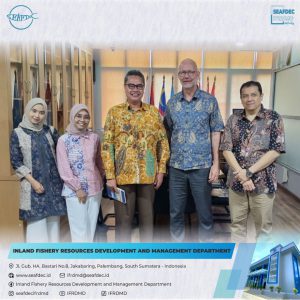Exploring Collaboration Between IFRDMD and NIVA for Sustainable Inland Fisheries and Aquaculture
 On 2 October 2025, the Chief of SEAFDEC/IFRDMD, Mr. Andi Soemono, welcomed Prof. Thorjorn Larssen, Deputy Managing Director of the Norwegian Institute for Water Research (NIVA), Oslo, Norway. He was accompanied by Dr. Arisman, Executive Director of the Center for Southeast Asian Studies (CSEAS), along with members of the CSEAS team. The meeting, held at the SEAFDEC/IFRDMD Meeting Room in Ancol, Jakarta, served as a constructive platform for exchanging ideas and exploring potential collaboration.
On 2 October 2025, the Chief of SEAFDEC/IFRDMD, Mr. Andi Soemono, welcomed Prof. Thorjorn Larssen, Deputy Managing Director of the Norwegian Institute for Water Research (NIVA), Oslo, Norway. He was accompanied by Dr. Arisman, Executive Director of the Center for Southeast Asian Studies (CSEAS), along with members of the CSEAS team. The meeting, held at the SEAFDEC/IFRDMD Meeting Room in Ancol, Jakarta, served as a constructive platform for exchanging ideas and exploring potential collaboration.
NIVA is widely recognized as Norway’s leading institute for both fundamental and applied research on marine and freshwater ecosystems. The organization brings together world-class multidisciplinary expertise across a broad spectrum of environmental, climatic, and resource-related fields. Its work integrates research, monitoring, evaluation, problem-solving, and advisory services at international, national, and local levels. Covering ecosystems from mountains, lakes, and rivers to fjords, coastal waters, and oceans, NIVA develops science-based knowledge and solutions to address challenges at the intersection of water, climate, environment, people, and society. This strong foundation has positioned NIVA as an important partner in advancing sustainable approaches to managing natural resources. NIVA for activity in Southeast Asia supported by Norway Embassy for ASEAN in Jakarta
During the discussion, IFRDMD and NIVA explored opportunities for collaboration in capacity building and training programs, with particular emphasis on small-scale inland fishers in Southeast Asia. The envisioned partnership aims to provide better skills, knowledge, and tools to improve the livelihoods of local fishing communities while ensuring the long-term sustainability of inland aquatic resources. Two main focus areas were highlighted: sustainable inland fisheries management and sustainable aquaculture practices linked to inland fisheries. Both are seen as crucial for strengthening food security, conserving biodiversity, and supporting the socio-economic resilience of communities that depend on these resources.
The potential collaboration is expected to deliver several important outcomes. First, it will strengthen human resource capacity through tailored training and knowledge-sharing initiatives. Second, it will foster innovation in fisheries and aquaculture practices that address both environmental and economic challenges. Third, it will promote sustainability by balancing ecological protection with community development. Finally, the collaboration aims to enhance the livelihoods of small-scale inland fishers by equipping them with the skills and approaches needed to remain resilient in the face of climate change and increasing resource pressures.
This initiative reflects a shared vision to ensure that inland fisheries and aquaculture remain sustainable, productive, and beneficial for present and future generations.
